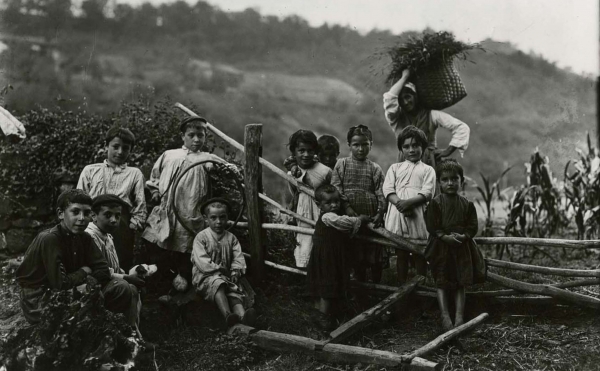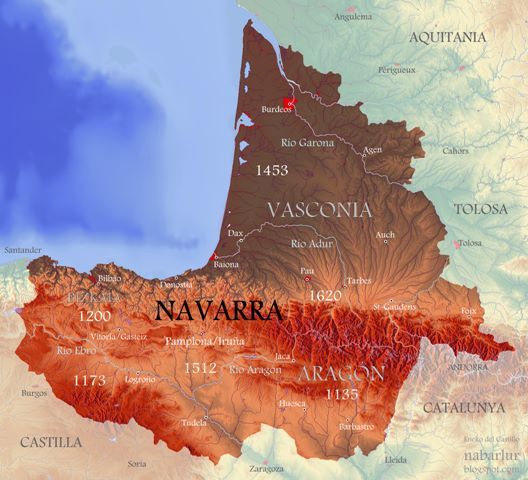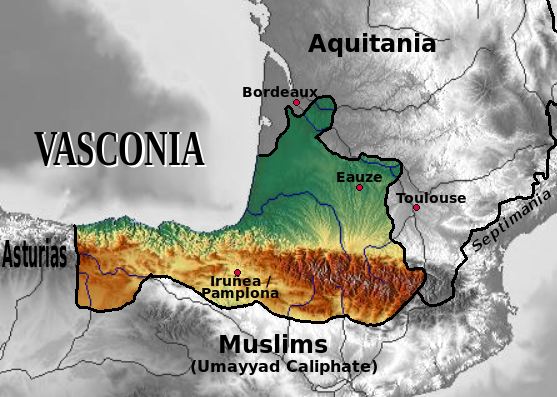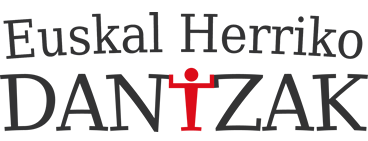The problem of identity: Indo-European and Basque
- Jon BALTZA
- 15/ 10/ 2001
One of the most interesting aspects of the Basque language (euskara) lies in the fact that it is described as a pre-Indo-European language. This gives us a pointer as to what elements we need to analyse to understand the peculiarities of the language.

1.
To say that euskara is a pre-Indo-European language implies that its linguistic structures differ in various ways, which will be looked at below, from those of the languages known jointly as Indo-European (Spanish, French and the other Romance languages, plus the Germanic languages, the Indo-Iranian group Slavic languages, Greek, Albanian, Tocharian, Hittite and the Baltic languages), which in one way or another are the dominant languages of today's world.

2.
This linguistic dominion or empire manifests itself in many different ways at both social/ state level (with the progressive preponderance of "party politics") and at the level of myth and ritual (on which the mental web which underlies the above level is woven).
At the core of both levels we find a peculiar Indo-European belief which I have called "belief in the identity of one with oneself", which consists imagining that one is who one is and that oneself is oneself. It is on the basis of this belief, the growth of which can be seen in ancient Indo-European morpho-syntactic structures, that the two basic concepts of the fabric of Indo-European myth and philosophy develop:
A. The concept of TIME/TENSE.
B. The concept of BEING/ EXISTING.
2.1
The concept of TIME/TENSE can be seen developing in ancient Indo-European verb structures as follows: the same marker "-M", denoting the first person, the job of which was presumably to indicate who was speaking, appears in two different places: indicating the person who is speaking (in this world IN which they are speaking) and indicating the person who once spoke (and belongs therefore to the world OF which they are speaking). In other words it indicates ME insofar as I am here, and it indicates ME insofar as I once spoke. The same marker is used for the present time IN which I am speaking and the non present time OF which I am speaking.
This location of myself at two different places as the same person (i.e. "I" who speak am the same as "ME" whom I speak of) is what produces the illusion that I remain the same and nothing has passed between those two places except TIME - a time that is in fact an imaginary SPACE in which I, being identical to myself, move between two points which are also ideal and imaginary, which I place in this temporal illusion.
Under this Indo-European illusion of time/tense the time in which I speak is re-interpreted as "the present", as opposed to the time of which I speak, which is re-interpreted as "the past" ("the future" appears later as a curious projection of "the past").
2.2
The same mechanism which produces a concept such as TIME/ TENSE also eventually produces the concept of BEING/ EXISTING in Indo-European languages. In effect, BEING/ EXISTING is no more than the other side of that peculiar identification between the two imaginary places or points at which I have located myself, because to locate myself at two points in that idea of TIME (which is in fact an idea of SPACE) I must have unbreakable faith in the identity of my self. In other words I must believe that I AM who I am and nothing else: that I am identical to myself and, using the verb which sums up the two sides of the question - TIME and BEING - I EXIST.
2.3
The belief in the identity of one with oneself is firmly rooted in the structures of Indo-European languages, and through the speakers of those languages the concepts of TIME/TENSE and BEING/ EXISTING have prospered to such a degree that without them it would be impossible to sustain the model of state and myth/ ritual which has extended throughout the world and which threatens to leave no breathing space in which we can simply live, with no need to exist.
3.
An analysis of euskara reveals that this Indo-European belief in the identity of one with oneself is absent from this pre-Indo-European language and that, in line with this, the Indo-European concepts of TIME/ TENSE and BEING/ EXISTING are also absent from the Basque linguistic environment.
3.1
The morpho-syntactic structures of Basque reveal a very different outlook from that detailed above.
3.1.1
The first point to emphasise is that verb structures in Basque (within the verb forms included by Lafon in the "active" category) fall into two very different groups: those in which the markers of person indicate the time of speaking and those in which the markers of person indicate the time spoken of. Different markers are used for these two forms.
For instance the marker of "first person" which indicates the time of speaking (i.e. the time at which I speak) is "-T", while the "first person" which indicates the time spoken of is "N-", so that a verb such as EKARRI ("to bring"), gives rise to "DAKAR-T", with the marker "T" marking the time of saying what is said, and "N-EKARREN", with the marker "N-", which does not mark the time of saying what is said.
The mere fact of using, as is indeed the case, two different markers to indicate two different and mutually irreducible worlds (the world IN which one speaks and the world OF which one speaks) means that the two moments cannot be identified as being two points in an ideal space, and therefore no substantive link is possible between them.
3.1.2
Since no illusory link is created between the two worlds there is no illusion of lastingness over time, so it is no surprise that no concept ever arose in Basque which could be identified with the Indo-European concept of BEING/ EXISTING.
The fact that "DA", the Basque copula which, in some of its uses, is closest to the Indo-European copula "IS" does not belong to the paradigm of the verb IZAN (inadequately translated as "to be") is evidence of the peculiarity of Basque on this point.
"DA" is in fact a deictic marker the main function of which is to mark or indicate the moment/ place of speaking, and therefore can hardly be used in an absolute sense, i.e. in a sense equivalent to the Indo-European copula in a phrase such as "The man IS" (= "The man EXISTS").
Moreover, this marker could even be understood and analysed as being the same as the marker (mentioned above) for "first person singular" of the active forms of what the linguist Lafon referred to as the "current" group, i.e. the marker "-T", the old "-DA".
It is a marker which indicates the time/ place of speaking, the speaker and even what is spoken, and thus remains faithful to the original sense and prehistoric function of the universal marker which in Spanish takes the form "YO", because "YO" is really just that: the place and time at which what is said is said, and at the same time the person who says what is said and indeed that which is said itself.
3.2
In accordance with this morpho-syntactic structure of Basque, in which there is no trace of the appearance or sustenance of any belief in the identity of one with oneself, it can be seen that concepts such as TIME/ TENSE and BEING/ EXISTING are patently absent from the Basque linguistic environment.
4.
All this leads us to the burning problem of identity and to the question which usually goes with it: of what does the identity of the Basques consist?, or in other words, what is "to be Basque"?
4.1
From what has been said above it can easily be understood that this question could not have arisen from the structure of Basque itself, because it assumes too many things: that "Basque" is something one can "be", and indeed that it is possible in general to "be" something. But neither "being" nor "Basque" exists as a concept in the Basque linguistic environment.
4.1.1
This last statement may come as a surprise, but it must be remembered that those of us who speak Basque have no other word for ourselves but euskaldunok, which means precisely "those who speak Basque". The term does not imply any elevation to any such metaphysical category as BEING/ EXISTING. Indeed the term "Basque" comes from an old Indo-European word (Celtic to be more exact) meaning something like "those who live on high ground". It is the Indo-European passion for BEING/ EXISTING and for lastingness in TIME, based on the belief in the identity of one with oneself, that structures the word and fosters all manner of dialectics on identity. And this, together with the Indo-European languages which some Basque speakers have had to learn, have come to stain the landscapes where, in spite of everything, the old pre-Indo-European language can still be heard, resisting attempts to identify it too far and make it BE or EXIST, and attempts to make it worry about TIME and its FUTURE, i.e. its death.
For a more detailed analysis of this approach, see JON BALTZA, Un escorpión en su madriguera. Indoeuropeo y euskara: mito e identidad. Ed. Hiria, Alegia (Gipuzkoa), 2000.








